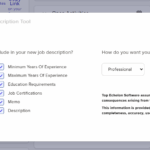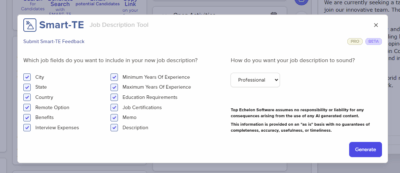Part of being a recruiter is adapting to the ever-changing industry and continuing to improve your strategies. To do this, you need to keep up with recruitment trends and network with other recruiters. Joining a recruitment association can be a smart career move to boost your connections, insights, and recruitment strategies and methods.
What is a recruitment association?
Associations bring individuals with a common interest together. There are many types of groups, like professional, trade, and religious associations.
Recruitment associations are groups of recruiters joined together to network, increase their knowledge of the industry, and strengthen their recruitment and hiring process. Recruiter associations fall under the category of professional organizations.
Recruiters usually pay an annual or monthly fee for membership in recruiting associations. The perks recruiters receive for joining the association vary depending on which group you join. There are international, national, state, and local recruitment organizations.
Recruiting associations
There are plenty of recruiting associations to pick from. If you are a niche recruiter, you might want to join a specific recruitment association for that industry. You might also consider general recruiting associations.
You can receive special offers and increase your benefits by joining multiple recruitment agency associations.
Take a look at these seven recruiting associations to get started.
1. American Staffing Association
The American Staffing Association (ASA) is a professional organization that promotes the advancement of staffing professionals. Once a member of the ASA, you will receive updates on laws and other recruiting-related issues.
Other membership benefits include the ability to market yourself with the ASA member logo, network and discuss topics with other recruiters, receive industry updates, and more. Through the ASA, you can also sign up to take a recruiter certification program.
You can apply for membership if you are a for-profit company and work in the headquarters office of your recruiting firm. The application fee is $100. Your annual membership dues are based on your recruiting firm’s gross sales. You can view rates on the ASA’s website.
2. Top Echelon
Top Echelon’s Recruiting Network is a nationwide membership organization that connects thousands of recruiters to one another.
Through the network, recruiters can enter into a split placement arrangement where one recruiter has the job order and the other supplies the candidate. And, members have access to a candidate database containing over three million candidate resumes.
In addition to the daily benefits of the group, members can attend networking events for recruiters to further their recruiting success.
The cost to join the network is a one-time startup fee of $330 and an additional $130 per month (per recruiting firm).
3. National Association of Personnel Services
The National Association of Personnel Services (NAPS) is a recruiting organization for recruiters who make permanent, temporary, or blended placements.
You can choose from an active or allied membership. The active membership is for recruiters and agencies while the allied membership is for industry partners that provide services to active members.
As an active member, you have access to network with other recruiters. You also receive free monthly recruiting webinars, monthly and quarterly newsletters, vendor and industry supplier discounts, discounts for NAPS Annual Conference, and more. If you decide you want to sign up for a recruitment certification program, NAPS offers two.
The cost to join NAPS varies, depending on whether you are an individual or firm. If you are an individual, your yearly fee is $360. If you are a firm with five or more employees, the price is $915 per year. For more information on pricing, visit the NAPS website.
4. National Association of Executive Recruiters
The National Association of Executive Recruiters (NAER) is an organization geared toward executive recruiters. Executive recruiters recruit for senior-level professionals like lawyers and doctors.
This association is not open to individuals, only firms. There are other requirements to join NAER, like your length of time in business, client references, and more. Once accepted into the association, you have access to member firms nationwide, the NAER conference, and insights into the industry.
5. National Association for Health Care Recruitment
NAHCR is a recruitment association focused on recruiters in the healthcare industry.
Membership in NAHCR provides recruiters with resources like a quarterly newsletter, listing of all members, conferences, and more. You can also opt to receive the Certified Health Care Recruiter certificate for a fee.
Individuals can join NAHCR as recruiters, vendors, or associates. To join NAHCR as a recruiter, you must pay annual dues of $150. You can also receive benefits by referring others to the association.
6. Recruitment Process Outsourcing Association
The Recruitment Process Outsourcing Association is an organization for RPO recruiters. As an RPO recruiter, you take on your client’s entire recruitment process and implement changes to improve their overall hiring strategy.
RPOA members have the ability to be spotlighted as industry experts. You can participate in question and answer blog posts and webinar programs. And, you can recognized by having your information on the RPOA website. You will also receive emails with lead information and more.
There are three different membership packages for RPOA that offer different benefits: Premium ($1,500 per year), Silver ($5,000 per year), and Gold ($10,000 per year).
7. State and local recruitment associations
You might consider joining a professional recruiting organization in your state. There are many localized recruitment associations, including:
- DFW Texas Recruiters Network
- Illinois Search & Staffing Association
- Minnesota Talent & Recruiting Network
- New Jersey Staffing Alliance
- Ohio Recruiters Association
- Georgia Association of Personnel Services (GAPS)
These are just some of the recruitment associations available. For more information, check with your state.









